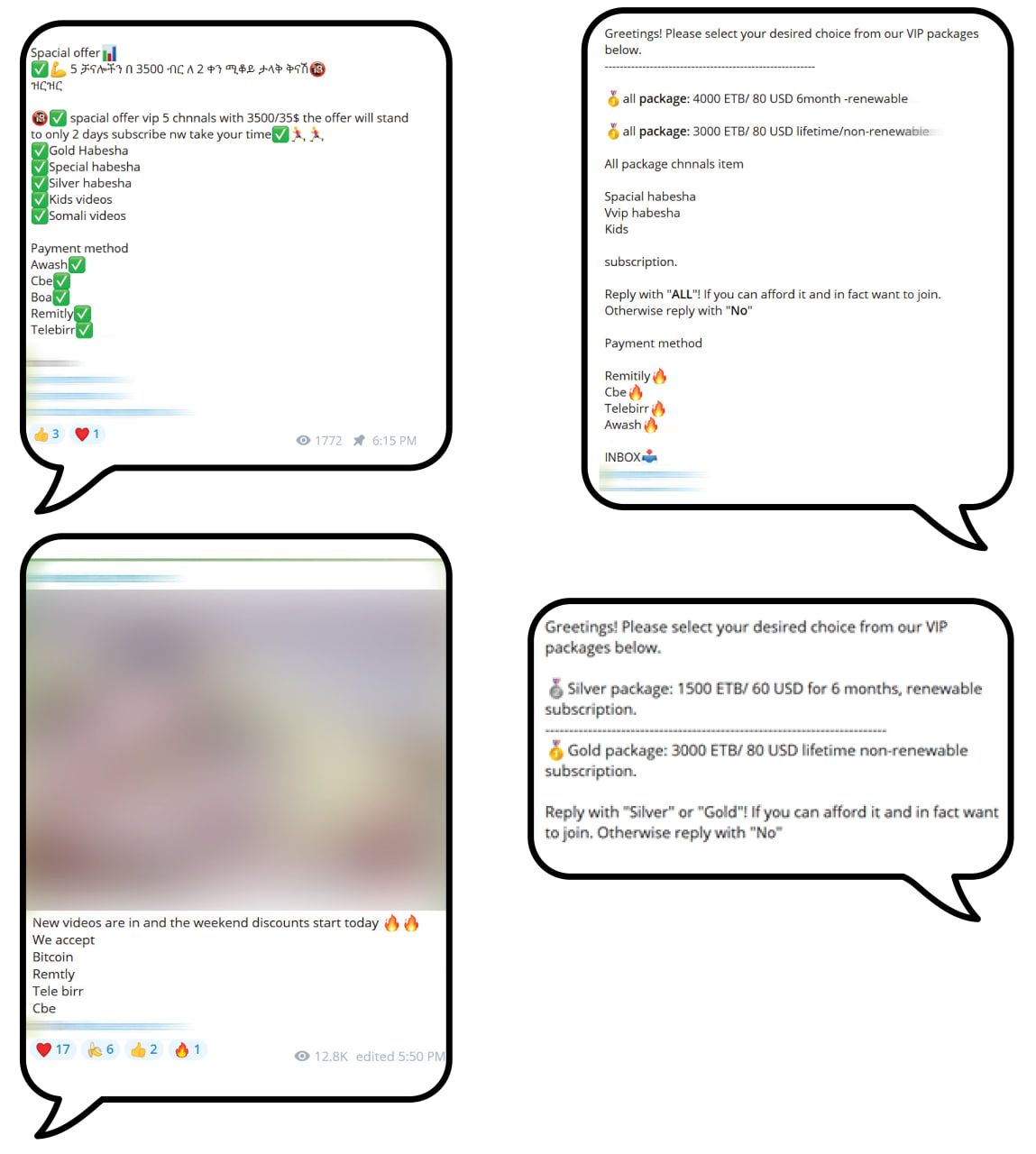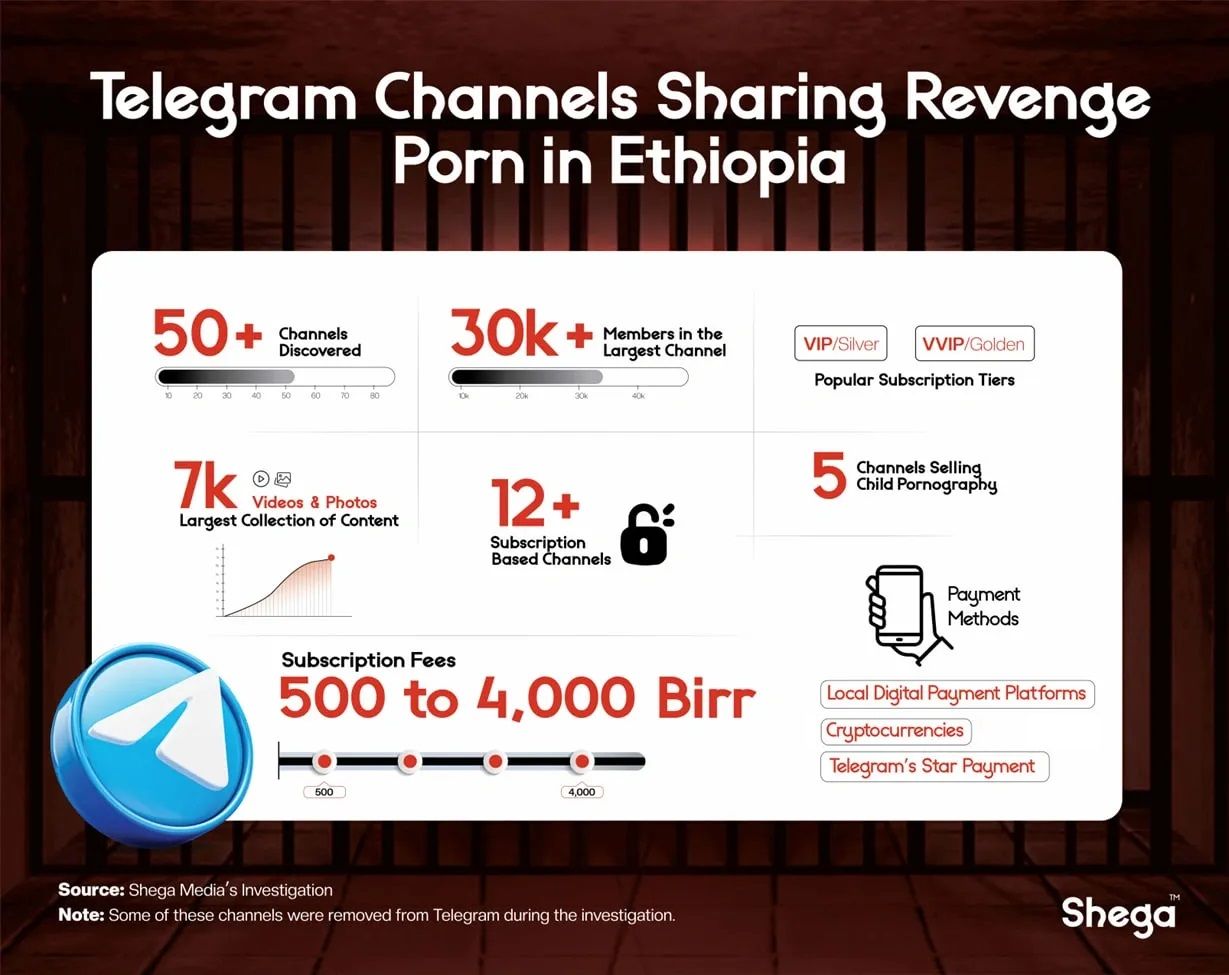Progress for 0 ad
Progress for 1 ad
Progress for 2 ad
Progress for 3 ad


Kaleab Girma
Addis Ababa, Ethiopia

Thousands of women are caught in the dark, shadowy corners of Ethiopia’s growing online world. Revenge porn, where nude or sexually explicit photos are shared without consent, has escalated into something more sinister: an organized industry.
Young women’s private moments are being exploited for financial gain on social media platforms facilitated by online payments. If left unchecked, this growing menace threatens to devastate the lives of countless women across the country. Cover Art- Nebiyu Geberemichael (Shega).
Warning: This story contains details that some readers may find disturbing.
____
She was young and full of trust. Hewan Tewelde, whose name has been changed to protect her privacy, no longer recognizes the person she has become. She often finds herself longing for the days before her world was shattered.
Born and raised in Addis Ababa, Hewan was never one for socializing. A quiet and reserved girl, she spent much of her time alone, finding the most comfort in her own company. She describes herself as shy, an introvert, and a bit of a recluse. But beneath the surface, she possessed a sharp sense of humor and a knack for seeing the lighter side of things.
As high school drew to a close, Hewan discovered an outlet for her creative tendencies in social media, particularly Facebook. Online, she felt a sense of ease, sheltered from the awkwardness of real-life interactions. During her freshman year at university, her connection to the digital world deepened with newfound access to Wi-Fi.
"I didn’t think people wanted to be around me in real life. But online, that was my space. I built a persona around comedy and humor," she recalls.
Her online presence flourished, and she built a network of friends who appreciated her wit. She stayed up late every night, chatting with these virtual friends in her dorm room. She now regrets it all.
Five years ago, a man reached out to her on Telegram, claiming to recognize her from Facebook and expressing admiration for her posts. For months, they talked. Looking back, Hewan realizes she was being groomed.
"He asked me everything about my life, my classes, my family, but he never shared anything about himself," she reflects. "In hindsight, I missed all the red flags. I trusted him."
After half a year of conversation, he started persuading her to send explicit photos. At first, she hesitated. But eventually, she gave in.
"I sent him my naked images," she says, her voice heavy with regret. "It was the biggest mistake of my life."
The moment she sent the photos, he blocked her. Hewan knew she'd been deceived, but she could barely foresee how profoundly her life was going to be impacted.
Five months went on, and Hewan found herself in a heated online argument with someone she had met on Facebook. In the middle of their exchange, this person revealed something that shattered her composure: he had her explicit photos.
She panicked as he threatened to expose her. Desperate to avoid public humiliation, Hewan retreated. She muted her online presence, hoping that compliance would make the threat disappear. In exchange, he promised to delete the photos. Out of fear and vulnerability, she even entered into a sexual relationship with him, hoping to stop further harm.
But the nightmare didn’t end there. Looking back, Hewan now suspects that the man who blackmailed her was likely connected to the one who first deceived her on Telegram.
The fragile peace she had found soon crumbled. After falling out with the man, he retaliated by leaking her private images to the world. Her reality collapsed. Her naked photos were posted in a Facebook group with thousands of followers.
“To avoid getting banned, they cropped the photos and attached links to a Telegram channel where the full images were posted,” Hewan sobbed, recalling the horror of seeing her intimate images exposed to the world. “I never thought it would happen. I never imagined it would go this far.”
Hewan is just one of thousands of women caught in the dark, shadowy corners of Ethiopia’s growing online world. Revenge porn, where nude or sexually explicit photos are shared without consent, has escalated into a crisis in Ethiopia. With increased access to the internet and a generation increasingly familiar with technology, more and more women are falling victim to this form of abuse.
While revenge porn often involves an ex-lover posting intimate content without permission to humiliate the victim, in Ethiopia, it has evolved into something more sinister: an organized industry. This abuse has moved from being a personal vendetta to a profitable business. Ethiopian women’s private moments are being exploited for financial gain on social media platforms, facilitated by online payments.
A six-month-long investigation by Shega has uncovered over a dozen Telegram channels profiting from leaked images and videos of Ethiopian women. These channels operate like subscription services, offering tiered access from free to premium (VIP).
Free channels serve as a lure, posting leaked images and videos weekly, enticing thousands of followers with the promise of more explicit content. Users are then baited to upgrade to paid channels for access to "exclusive," "longer," and "higher quality" content.
Paid channels offer multiple tiers, with names like "VIP" and "golden packages." Prices vary depending on the chosen tier, and payments are streamlined through Telegram bots, which even offer “customer support” to facilitate transactions. Users who pay and provide proof (screenshots) are granted access to private channels filled with illicit content.
The scale of the abuse is shocking. Some free channels have over 30,000 members, with over 7,000 leaked images and videos. Paid channels, though smaller, have hundreds of paying subscribers, potentially generating significant revenue for the owners.

Telegram’s encryption and privacy features, while intended to protect users, are being exploited by these abusers. Furthermore, These transactions happen online, and the anonymity of it all allows the channel owners to operate with impunity.
According to Leoul Mekonnen, Founder & CEO of Hulugram, a Telegram-based super app, such types of channels manage to stay under the radar of the public eye and Telegram's crawl bots because they are private.
"Telegram bots only crawl public channels. Public channels have a username, making them searchable and open for anyone to join. Private channels, however, are closed, and you need to be added by the owner or receive an invite link to join," he explains.
He further notes that administrators of private channels can restrict the sharing of the channel or its content, essentially creating a secure haven for abusers to build exclusive distribution networks. This setup also provides an ideal scenario for criminals to monetize their content.
In addition, some of these channels also share child pornography. Shega has identified five channels that promote and share child pornography, showing the predatory nature of these channels does not stop at women.
Images and videos of underage Ethiopian girls are actively shared in these groups among a larger body of explicit and exploitative content of minors downloaded from the web. Shega’s investigation has also uncovered channels entirely dedicated to sharing child pornography, with entry fees starting at 500 and 1,000 birr.
These channels exploit Ethiopia's trusted digital payment systems such as telebirr, the mobile money service from state-owned telecom operator Ethio Telecom, and the digital channels of the Commercial Bank of Ethiopia. Membership fees ranging from 500 birr for low-level tiers up to 4,000 birr for ‘premium’ access are charged by the channel admins.
International transactions are also facilitated through Remitly, an American online remittance service based in Seattle. Unfortunately, channel admins are signaling a shift towards cryptocurrencies, rendering traceability and accountability even less likely.
Some predators have also launched websites dedicated to sharing such content, operating on a subscription basis, just like the Telegram channels. Admission is granted only after users pay the required fee.
In August 2024, Telegram boss and founder Pavel Durov was placed under formal investigation in France as part of a probe into organized crime on the messaging app.
Telegram, which has amassed more than 950 million users, thanks in large part to encryption technology and promises of user privacy, has for years been criticized for its popularity among unsavory internet characters and criminals.
The Russian-born billionaire was charged with suspected complicity in allowing illicit transactions, drug trafficking, fraud, and the spread of child sexual abuse images to flourish on his site.
Following the founder's arrest, Telegram made some changes to reduce criminal activity on the platform, Durov stated in a post on the app. Chief among them: Telegram has updated its terms of service and privacy policy to note it will hand over the IP addresses and phone numbers of users who violate its rules to authorities in response to “valid legal requests.” The platform says it will disclose all user data that is shared with law enforcement officials in quarterly transparency reports.
Shega sent the findings of its investigation to Telegram. However, the social media giant did not respond to questions.
Child pornography is banned on Telegram. In addition, Telegram’s terms of service prohibit the posting of illegal pornographic content on publicly accessible channels. However, this policy raises more questions than it answers.
“Does this mean Telegram users are allowed to share illegal pornography, such as revenge porn, in private groups? Is any form of pornography permitted on Telegram? If so, how does the platform distinguish between legal and illegal content?”
These, along with other inquiries about Telegram's content moderation and reporting mechanisms, were part of the questions we sent to the Telegram Press Team via their official bot, which remain unanswered.

The cultural norms in Ethiopia are deeply conservative, making the release of such content incredibly stigmatizing. Most of the videos show women mentioning their partners’ names, indicating the content was never meant for public consumption. In some videos, the men are blurred while the women are left fully exposed: a deliberate act that reveals the malicious intent behind the leaks.
“No reasonable person would believe that these images were shared publicly with the consent of the women,” said Salem Tadesse, a women’s rights activist who has been actively fighting against revenge porn in Ethiopia.
According to Salem, these images are often leaked by ex-boyfriends with the intention of harming the women. She also highlights a troubling practice where men sell the images to various channels.
“The digital space reflects the harsh realities women face on the ground in Ethiopia,” she explained.
Salem further stated that the motive behind these actions is to break the women and 'teach them a lesson.'
“In fact, the men who engage in these acts are sometimes celebrated as heroes within their social circles,” she added.
“The culture holds a perception of ‘good women,’ and those who have recorded naked images of themselves are seen as disgraceful. When the photos are leaked, these women do not receive sympathy from the public or their families, as they are viewed as the ones at fault. This leads to internalizing shame and guilt, and the victims often do not seek justice,” Salem told Shega.
Behind every leaked image lies a shattered life. The women targeted by this digital abuse endure unimaginable trauma, shame, and social isolation. Fear becomes their constant companion, as any day could mean exposure.
Hewan shares her painful experience: "After my images were leaked, I attempted suicide six times." Her first attempt came just a month after the ordeal began. “My father used to take a lot of medicine. I took several different pills all at once.”
Though the pills weren’t strong enough to end her life, they left her with permanent stomach and liver damage. Hewan tried to rebuild herself afterward and managed to avoid suicidal thoughts for a time. But a few months later, when another anonymous person sent her the images again, it broke her down once more, and she wanted to end it all over again.
“People who saw the photos turned on me. They kept telling me that my life would never change, that I should just kill myself.”
Hewan’s last suicide attempt was around a year ago.

Despite a shortage of academic studies researching this new phenomenon, some papers on the online abuse of women in Ethiopia point to a worrying picture. According to research carried out by the Centre for Information Resilience (CIR), a U.K.-based nonprofit organization, women in Ethiopia are being silenced, shamed, and threatened by widespread online abuse that has become “so normalized it’s invisible.”
The study published in May 2024 revealed that women in Ethiopia face pervasive online abuse, leading to their withdrawal from public spaces and limiting their participation in public life. The research is based on interviews with 14 women in prominent positions and analysis of thousands of social media posts in multiple languages to identify the nature and target of hate speech.
The study showcases the mental health impacts and offline violence resulting from online abuse. Over 78 percent of the interviewed women reported feelings of fear and anxiety after experiencing online abuse. The abuse also harms their professional lives, reputation, and psychological well-being, leading to trauma, depression, and stress. Disturbingly, offline violence, including physical assaults and arrests, often follows online abuse, with some women having to flee the country for their safety.
The research further reveals that online abuse against women in Ethiopia is normalized and accepted, making it difficult for victims to seek support. Such abuse leads to the withdrawal of women from public life and perpetuates their marginalization in society.
Young women like Hewan face relentless extortion, bullying, and blackmail. Men who obtain their leaked photos weaponize them, threatening to send the images to their families unless the women submit to their sexual demands.
Hewan’s suffering has stretched far past the initial leak of her photos.
“He never stopped threatening me. He used to say things like, ‘I can ruin your life. I’ll send the photos to your father. I’ll print them out and post them in your neighborhood.’”
All of Hewan’s family members, except her father, have seen the images. Using anonymous Telegram accounts, the abusers shared the photos. “Even when I started a relationship, I don’t know how, but they managed to send the images to my boyfriend.”
“It’s too much. It’s as if they don’t want me to live.”
This brave survivor's story exposes a chilling truth: these channels aren't just about profit; they're a predatory operation designed to exploit and coerce women. In some photos where the leaked image does not show the woman’s face, other headshot images are attached to reveal who they are. In some instances, even the names are inserted with their phone numbers. Left unchecked, this trend will devastate countless Ethiopian women.
Hewan also says many people in her life ostracized her after they became aware of her situation. Even as she begins a new chapter in her life and meets new people, the thought ‘Do they know, have they seen it’ constantly slits through her mind.
In June 2016, Ethiopia's House of People's Representatives enacted the Computer Crime Proclamation 2016. This legislation while criminalizing child pornography, it notably lacks specific provisions to address revenge porn.
Under the section on illegal content, the Proclamation stipulates that anyone who intentionally produces, sells, distributes, or possesses unauthorized digital images or videos depicting a minor engaged in sexually explicit conduct is subject to imprisonment ranging from three to ten years.

Globally, several developed countries, including the UK, USA, Canada, Germany, Italy, Israel, and Singapore, have enacted specific laws criminalizing revenge porn. These laws impose penalties such as imprisonment or significant fines for sharing another person’s private sexual content on social media or other digital platforms. Additionally, they provide reporting mechanisms, allowing victims to file complaints online, through call centers, or at police stations.
In Africa, South Africa and Zimbabwe have also introduced legal measures to combat revenge porn. During the 13th Internet Governance Forum held in Addis Ababa in November 2024, Daniel Molokale, a representative from Zimbabwe, highlighted the country’s struggles with the proliferation of revenge porn. “We have now criminalized it,” he stated.
Zimbabwe criminalized revenge porn via its Data Protection Act, which is the equivalent of Ethiopia’s Personal Data Protection Proclamation.
Prominent lawyer and legal consultant Mulugeta Belay states that although Ethiopia does not have a legal framework addressing the various intricacies of revenge porn, he emphasizes that the path to justice remains open for victims.
"The constitution and the international treaties Ethiopia is a signatory to strongly uphold personal privacy," Mulugeta told Shega.
“Regardless of the reasons these nude images or videos are recorded and shared, it does not grant the receiver or anyone else who might possess them the right to transfer the content to third parties. Clear and explicit consent is required,” he stated.
The lawyer further explained that acts of revenge porn violate several laws, and victims can pursue both legal and criminal actions.
"Legal provisions for crimes against public morality and the reputation of individuals can be invoked to launch criminal and civil cases. When blackmail is involved, or when the victim is a child, the law provides for harsher penalties," Mulugeta said.
The Computer Crime Proclamation stipulates that sharing defamatory digital content is punishable by imprisonment up to three years, or a fine not exceeding 30,000 birr, or both. If the offense is repeated and causes fear, threats, or psychological harm, the penalty increases to up to ten years.
Mulugeta, however, still stresses the need to revise the Computer Crime Proclamation and the Personal Data Protection Proclamation to better address such abuses.
Ethio Telecom has stated that it's extremely alarmed by the online sexual exploitation of young women in Ethiopia.
"We have not received such reports yet. However, this is a seriously disturbing trend that can destroy a generation of young women," said Mesay Woubshet, Chief Communication Officer.
Ethio telecom has blocked access to pornographic content on its network for over eight months.
"We have done this with the bigger picture in mind and as part of our social responsibility. Users cannot access pornographic websites on the Ethio telecom network, whether it's mobile data or Wi-Fi," Mesay added.
While the company has taken measures to promote healthy connectivity on its network, management acknowledges the challenges of tracking such content purchases and subscriptions facilitated via telebirr without first receiving a formal report.
“Ethio telecom’s security department actively monitors fraudulent transactions on telebirr. We have deployed systems to detect activities such as money laundering and terrorism financing, as these often share characteristics that can help us identify them. However, the administrators of these telegram channels typically receive payments of 500 or 1,000 birr, which makes the transactions appear ordinary,” explained Biruk Adane, Chief telebirr Officer.
Ethio Telecom informed Shega that it is ready to take necessary actions. However, the officials emphasized that tackling this growing underground industry requires a collaborative effort involving law enforcement, prosecutors, the Ministry of Women and Children, and women’s rights organizations.
"Blocking a few subscriber’s SIM cards or telebirr accounts won’t be enough to create the desired meaningful impact,” Biruk noted.
Salem, the women’s rights activist, also advocates for a broader approach to tackling the issue.
"A few men facing legal consequence does little to combat gender-based violence, as it is a deeply rooted systemic issue. The women whose nudes are leaked by abusive men often face even more violence from their fathers and brothers at home, who feel she has dishonored their name,” said Salem.
"This highlights how the issue permeates all the way to the family level, where these women are still not safe. I hope the conversation grows from the usual calls for legal reform," she adds.
CIR, the U.K.-based nonprofit organization that researched the online abuse of women in Ethiopia, is calling for urgent action to address this issue. The study proposes practical solutions, including educational campaigns, the establishment of an online reporting network for abusive content, and the introduction of laws criminalizing online harassment and abuse.
The study’s recommendations also emphasize the need for social media platforms to take greater responsibility in combating online abuse, enhancing reporting processes, and developing context-specific lexicons to improve content moderation in low-resource languages.
"Educating young women about the dangers of revenge porn and the importance of digital safety is very crucial," adds Salem.
Sharing her motivation for speaking out, Hewan stated, "I know I am not alone. Even as we discuss this now, some poor girl’s photo is being circulated on Telegram. I want this to stop."
Despite her trauma, Hewan continues to fight for her mental health and advocates for change, refusing to let the perpetrators dictate her future.
"I don’t want any other girl to suffer the same fate," she added.
👏
😂
❤️
😲
😠

Kaleab Girma
Kaleab Girma, an Addis Ababa-based reporter and researcher, with over six years of experience in the field. He currently serves as Shega's Editor-in-Chief and specializes in reporting on small businesses, innovation, technology, and startups in Ethiopia.
Your Email Address Will Not Be Published. Required Fields Are Marked *